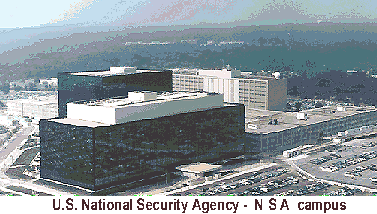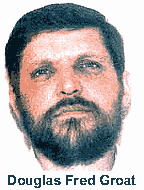 Spy Charge Vs. Ex-Pentagon Analyst
Spy Charge Vs. Ex-Pentagon Analyst

By Michael J. Sniffen, AP Writer, Oct. 13, 1998, © 1998 AP
Washington (AP) -- The FBI charged a former analyst with the Pentagon's supersecret National Security Agency with selling top defense secrets, including targets for U.S. nuclear weapons, to the Soviet Union during 1988-1991 for $60,000.
The government said the information he delivered to a Soviet KGB agent he knew as "Igor'' included details of U.S. targeting of tactical nuclear weapons in case of a Soviet nuclear attack and of the U.S. military's interception of signals intelligence, the Justice Department said.
The weapons targeting data were in the top-secret U.S. Signals Intelligence Directive 514, dated May 6, 1988, which the government said Boone gave a copy of to the Soviets. It included information on "the targeting of U.S. nuclear weapons against Soviet targets,'' the government quoted Boone as saying.
In addition, he provided the Soviets with U.S. documents describing the movement and capabilities of Soviet forces and about Soviet tactical nuclear weapons, the government said. This included data designated "top secret'' and the even-more-secret "sensitive compartmented information,'' which the government said "could potentially cause grave harm to the national security of the United States.''

The Justice Department gave this account:
Boone volunteered to spy for the Soviets when he walked into their embassy here in 1988. At that time, he got $300 from them in return for a classified document he had written based on decoded NSA intercepts of electronic transmissions by a foreign government.
He arranged to continue spying while he was assigned as a cryptoanalyst for the Army in Augsberg, Germany, during 1988-1991, when he left the service. During those years, he met about four times a year with Igor and was paid $5,000 to $7,000 at each meeting, for a total of more than $60,000.
Before his assignment to Germany, he spent three years as a senior cryptologic traffic analyst at the NSA's headquarters at Fort Meade, Md., in the Washington suburbs.
Boone spent most of his Army service as a signals intelligence analyst, dissecting foreign electronic communications overheard abroad and decoded by the NSA. He had joined the Army in October 1970 and got top-secret clearance within months. He was trained to handle sensitive compartmented information in 1976.
  On Sept. 5 of this year, an individual cooperating with the FBI telephoned Boone at his home in Germany and posed as a spy for the SVRR, the Russian successor to the Soviet KGB spy agency. The phony Russian spy said he wanted Boone to resume spying and set up a meeting with him in London on Sept. 12. The government said that at the London meeting, Boone recounted his career as a spy for the KGB, accepted $9,000 cash and agreed to meet again in Virginia this month.
(full text) On Sept. 5 of this year, an individual cooperating with the FBI telephoned Boone at his home in Germany and posed as a spy for the SVRR, the Russian successor to the Soviet KGB spy agency. The phony Russian spy said he wanted Boone to resume spying and set up a meeting with him in London on Sept. 12. The government said that at the London meeting, Boone recounted his career as a spy for the KGB, accepted $9,000 cash and agreed to meet again in Virginia this month.
(full text)

Former Pentagon Analyst Charged
With Working as Double Agent
The Salt Lake Tribune, Associated Press
Washington -- The FBI on Tuesday charged a former analyst at the Pentagon's supersecret National Security Agency with selling top defense secrets, including targets for U.S. nuclear weapons, to the Soviet Union during 1988 to 1991 for $60,000.
The former employee of the government's top eavesdropping and code-breaking agency, David Sheldon Boone, 46, who has been living in Germany, was arrested after being lured here by an FBI sting in which agents posed as spies for Russia trying to get him to resume spying, the Justice Department said.
Boone was charged with espionage, which carries a top penalty of life in prison, or death if certain conditions are met.
The government said the information he delivered to a Soviet KGB agent he knew as ``Igor'' included details of U.S. targeting of tactical nuclear weapons in case of a Soviet nuclear attack and of the U.S. military's interception of signals intelligence, the Justice Department said.
(full text)
Bloody Strike 'spured me to spy for West
www.novedades.com --- México City May 4 1998, Associated Press, Gdansk Poland -- Former CIA spy
Ryszard Kuklinski said Sunday that the military s bloody crackdown on an anti-Communist strike in Poland inspired him to spy for West.
Fired CIA spy accused of
giving secrets to foreign governments
The Detroit News - Apr. 4, 1998
Washington -- A disgruntled spy fired by the CIA was charged with espionage and extortion Friday, accused of giving highly sensitive information to two foreign governments after the United States refused to pay him more than a half-million dollars. He could face the death penalty if convicted.

Douglas Fred Groat was accused of having told the governments last spring that U.S. intelligence had broken their secret codes. In 1996, months before he was fired, he had threatened to tell unspecified foreigners what he knew unless he was given the money, according to a federal indictment unsealed Friday.
Tenet said in a separate statement Friday that Groat last had access to classified information in 1993. The director referred to Groat's "attempted" extortion, and officials familiar with the investigation said the CIA never paid any of the money.
"The full extent of any damage to U.S. national security has yet to be determined," Tenet said. The arrest, he said, "demonstrates that the U.S. government will not rest in our efforts against those who would commit espionage against the United States nor will we be intimidated by threats of blackmail."
The code-breaking information alleged to have been disclosed by Groat represents "probably the single most important thing that our intelligence agencies do," said Steve Aftergood of the Federation of American Scientists, a group that follows the CIA. "Compromising that activity to foreign governments would mean a grievous blow to U.S. intelligence. This is not just a document or a piece of information, this is two entire intelligence enterprises that have been shut down."
"This case involves highly sensitive classified information that could have a serious impact on the national security of the United States," U.S. Attorney Wilma Lewis said in a statement outside the U.S. Courthouse in Washington.
Lewis said Groat "participated in classified covert operations aimed at the penetration of cryptographic systems of foreign governments" -- the codes governments use to protect their secret communications.
(full text)
SEE ALSO:
How to become a spy (and why not)
Spy agency ends checks
C-News --- Friday November 13 1998
Spy agency ends checks By Tom Godfrey The Canadian Security Intelligence Service has turned over to the immigration department some of its duties in conducting background checks of newcomers to this country a secret
Spy's secret story: The spy they put out in the cold
reports.guardian.co.uk --- Nov. 13 1998. --
The Belgian spy Marthe McKenna emerged from the first world war a national hero...
US Warns N. Korea on Suspicious Site
Waco Tribune-Herald --- Site By George Gedda, Associated Press Writer Washington, AP --The United States is prepared to walk away from a key 1994 nuclear agreement with North Korea unless that country can allay U S suspicions
Chinagate
The Washington, Weekly --- Bernstein and Munro have pooled their extensive experience observing China to produce a shocking account of what they believe will be the the major global rivalry in the first decades of the twenty-first century the rivalry that will force |